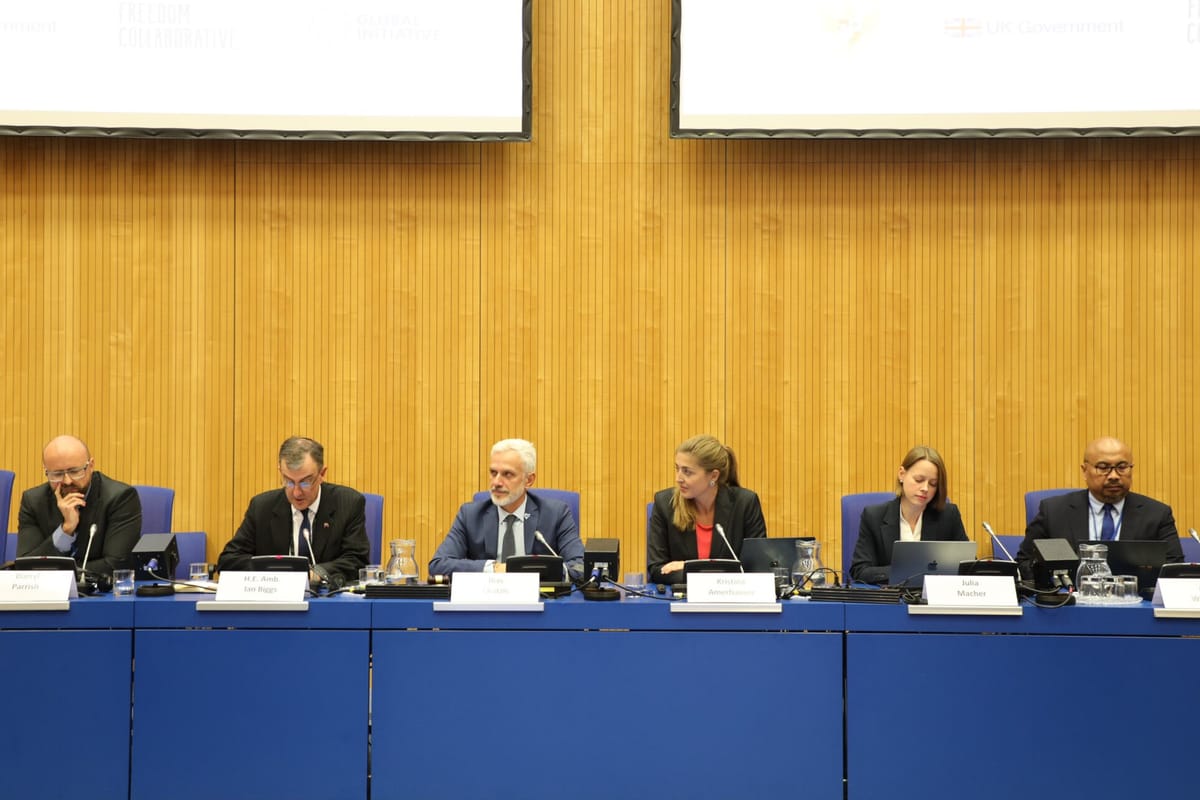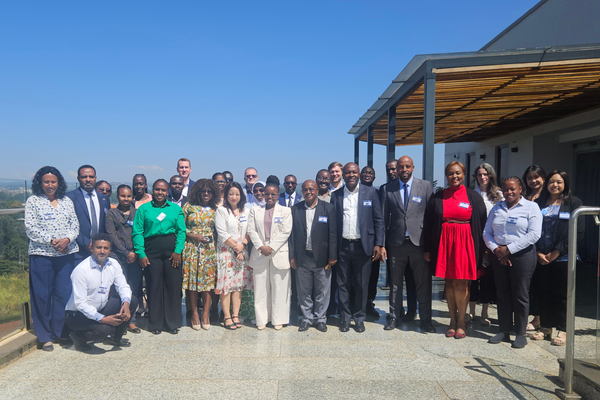CSOs must have a place at the table in global discussions on TIP for forced criminality
Freedom Collaborative and others urge recognition of CSOs as key partners in the fight against organized crime, a U.S. court holds Chiquita liable for complicity in human rights abuses, and a report series highlights the benefits of giving adults in the UK’s NRM the right to work.

Freedom Collaborative was honored to represent our civil society partners at the 12th Session of the Conference of the Parties to the UN Convention against Transnational Organized Crime (UNTOC COP12) earlier this month. At a side event organized by Australia, Indonesia, the UK, and the Global Initiative Against Transnational Organized Crime (GI-TOC), alongside Freedom Collaborative, we advanced the view that civil society organizations (CSOs) must be fully included in discussions on effective implementation of the UNTOC, also known as the Palermo Convention, which fosters global cooperation to combat criminal networks such as those involved in online scamming operations.
The side event, titled “Actionable solutions to organized fraud and human trafficking in South East Asia from a broad transnational crime perspective”, provided a situational update on online scamming operations and the forced criminality which fuels them, drawing on the latest research. This included our upcoming policy report, produced in partnership with the Regional Support Office of the Bali Process, which assesses where the overall response stands in terms of progress and outlines the priorities identified by civil society. The event further explored the criminal ecosystem surrounding scam centers and the factors that enable them to become major hubs for illegal activity,and offered practical pathways that stakeholders can follow in their efforts to dismantle these operations.
During this event, we emphasized the fact that, as transnational criminal networks involved in online scamming continue to expand, and the sophistication of their operations continues to outpace current response efforts, a collective and unified response among stakeholders remains crucial. Those working on the ground have particular insight into the way in which human trafficking is used to fuel these operations, and the mechanisms that enable it. Therefore, including their understanding and expertise in global discussions on response strategies would strengthen efforts to develop targeted, effective interventions to disrupt these networks and protect vulnerable populations.
A recent roundtable with members of our Trafficking for Forced Criminality Response Working Group highlighted some of these insights, which we shared at the event and which inform our forthcoming report. For example, attention on this crisis must be sustained and supported, and there must be much greater investment in resources for frontline organizations, to close the gap between the extent of global concern about this issue and the funding currently available.
Our ground-level partners also emphasized the importance of exchange forums that clarify roles, prevent duplication, and facilitate the sharing of best practices, noting that responses tend to be stronger in areas with robust partnerships that improve collaboration and create pathways linking local initiatives to regional efforts. Moreover, they highlighted the need to enhance victim support and protection, especially in victim identification processes, saying that, while training is essential, it does not always translate into effective implementation. Furthermore, it remains vital to improve the evidence base and access to relevant data, which is crucial for informing effective response strategies – from raising awareness to designing prevention programs and targeting financial flows – starting with investment in robust data infrastructure.
This call for better data ecosystems is echoed in a new report from GI-TOC, which assesses the implementation and impact of the Convention. It cites a lack of centralized data as a key obstacle to effective implementation, and a gap that hinders its ability to deliver impactful results. GI-TOC is now calling for more robust data collection, greater transparency, and deeper engagement with civil society in order to strengthen the Convention, and recommends the creation of an independent research center to monitor organized crime trends and track the Convention’s progress.
The Convention has provided a crucial legal framework for addressing crimes such as human trafficking, migrant smuggling, and firearms trafficking since its adoption in 2000, and a Conference of the Parties to the Convention was established to improve the capacity of states to combat crime syndicates and review the implementation of the Convention. This year, to ensure the meaningful and effective engagement of non-governmental stakeholders, the UNODC Civil Society Unit (UNODC CSU) organized various dialogues and discussions, and supported a side event dedicated to the launch of the Civil Society Declaration on More Effective Implementation of the UNTOC, organized by the Alliance of NGOs on Crime Prevention and Criminal Justice. With more than 150 signatories, the Declaration calls for greater CSO involvement in the fight against criminal networks.
Here’s a round-up of other noteworthy news and initiatives:
A new set of reports highlights the benefits to be gained by the UK and survivors of human trafficking and modern slavery if every adult in the country’s National Referral Mechanism (NRM) was granted the right to work. Published by Kalayaan, which supports migrant domestic workers, the series was launched at an event in the UK Parliament last week.
A report on Community Approaches to Poverty Alleviation in Malaysia, published by The Society for the Promotion of Sustainable Development Goals, explores the multifaceted challenges of poverty in the country. It offers critical insights into local efforts aimed at combating poverty, and underscores the importance of a holistic community-driven approach to poverty reduction.
The German Institute for Human Rights has released a monitoring report on human trafficking in Germany through its National Rapporteur Mechanism, which exists to make trafficking in human beings visible, establish a solid base of data, monitor case law and legislation, and provide practical advice for stakeholders. While its analysis indicates that efforts to combat trafficking and support victims have been strengthened in many areas, it also finds much more must be done to implement human rights and European standards in the area of trafficking in persons.
A U.S. court has upheld a landmark jury verdict for victims of paramilitary violence in Colombia against Chiquita Brands International, rejecting the banana giant’s motion to reduce the award for each plaintiff. In June, a federal court jury found Chiquita liable for financing the United Self-Defense Forces of Colombia (AUC), a paramilitary death squad, and awarded 16 plaintiffs whose loved ones were murdered by the AUC a total of US$38 million. This historic ruling marked the first time an American jury has held a major U.S. corporation liable for complicity in serious human rights abuses in another country.
A recent field study on forced labour in Malaysia and Thailand highlights the necessity of a multi-pronged approach to combat forced labour in global supply chains. Part of the Dynamic Sustainability Lab’s Global Supply Chain Transparency Project, the report reinforces that eradicating forced labour requires a collective effort from governments, companies, consumers, and workers to prioritize ethical practices, transparency, and accountability.
An in-depth story on forced criminality in Southeast Asia published in The New York Times cites USAID Thailand CTIP and Humanity Research Consultancy’s recent report Responses to Trafficking in Persons for Forced Criminality in the Thai Context. The report provides an overview of the situation, covering trafficking routes, modi operandi and trends related to TIP for forced criminality, and outlines the legal frameworks that address forced criminality at the domestic, bilateral and regional levels.
The OSCE and the Regional Support Office of the Bali Process have launched a Policy Brief on the Use of Generative Artificial Intelligence to Facilitate Trafficking in Persons, which aims to provide policymakers, law enforcement agencies, and the technology sector with essential insights to help anticipate and proactively address AI’s potential impact on human trafficking. A launch event and online discussion on the topic will take place on 1 November, 9:00-12:00 CET.




